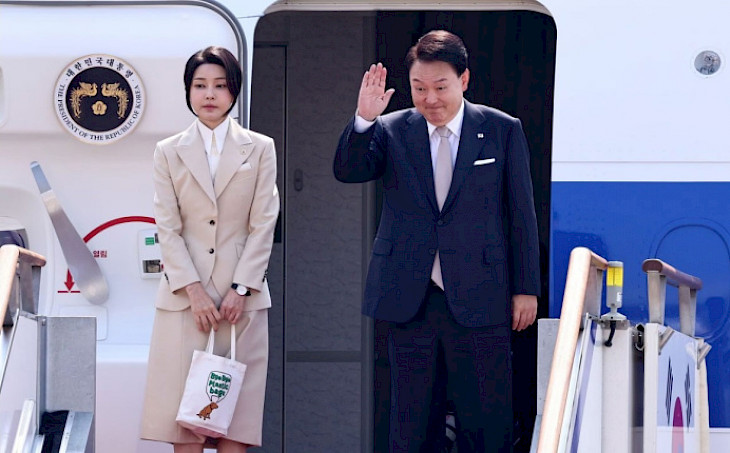On June 10, 2024, the official visit of the President of the Republic of Korea, Yoon Suk-yeol, began in Turkmenistan, followed by visits to Kazakhstan and Uzbekistan. Although Kyrgyzstan and Tajikistan are not on the list, it is evident that the goal of these visits is to further strengthen relations and diversify trade and economic routes connecting Korea with Central Asian countries, as noted in an editorial by the portal Orient.tm.
These efforts can be seen as part of a broader South Korean strategy aimed at strengthening ties with the Eurasian continent and creating new economic opportunities. As part of this strategy, the Republic of Korea plans to develop new platforms for enhancing cooperation, similar to the existing Business Council and the Korea-Central Asia Forum. The latter is considered an effective platform for promoting joint projects in various fields.
A key part of South Korea's new strategy is the creation of a regular summit titled the "Korea-Central Asia K-Silk Road Initiative," the debut of which is expected in 2025 in Seoul. This will be one of the topics of discussion during the current visit.
Strategists from the South Korean president's administration have also stated that Seoul plans to increase its role in Central Asia by focusing on cooperation in four areas: natural resources, economic development assistance, cultural exchange, and expanding contacts at both official and private levels.
Kim Tae-hyo, the first deputy director of the National Security Office in the South Korean president’s administration, stated at a briefing that interactions with the countries in the region will target specific areas developed in each particular country, while candidly noting that South Korea is particularly attracted to Central Asia's vast natural resources. To this end, Seoul will undertake extensive efforts and diplomatic activity.
The upcoming visit of the South Korean president includes scheduled talks with the leaders of Turkmenistan, Kazakhstan, and Uzbekistan, as well as participation in protocol business forums.
What interests the host countries?
Of course, South Korea attracts Central Asian states primarily as a country that has become advanced through rapid development in key economic sectors and achievements in high technology.
Despite limited natural resources, the South Korean economy has established itself as export-oriented, with developed heavy and chemical industries, shipbuilding, and the production of numerous consumer goods such as electronics and automobiles. The ability to maximize trends in digital trade and related technologies makes the South Korean economy one of the most innovative and competitive in the world, making it an attractive partner.
Moreover, the country’s success can be attributed to its significant investment in education, which has created a strong pool of highly qualified labor.
All of this combined warrants the close attention of the host countries receiving the visitor.
Regarding specific bilateral relations, it is worth mentioning the active participation of South Korean giants (such as LG, TOYO, Hyundai, etc.) in the construction of gas-chemical facilities in Turkmenistan, a desulfurization complex at the Galkynysh field, and the equipment of several important facilities.
Given the wealth of Turkmenistan's natural resources and the experience gained from working with local partners, it seems likely that South Korean companies will continue to show interest in building new plants for the production of phosphorus and urea fertilizers, as well as expanding cooperation in high-tech sectors, energy, and infrastructure projects.
One could predict the aspiration of Caspian countries like Turkmenistan and Kazakhstan to establish cooperation in shipyard modernization, ensuring digitalization and the introduction of technical innovations. However, the shallowing of the Caspian Sea (even if cyclical, as many ecologists assert) is likely to delay the implementation of such plans in the coming years, except for potential projects related to dredging technologies and works in this area.
Nevertheless, thinking about the future, the Turkmen shipbuilding plant "Balkan" and the South Korean company KSIT have signed a contract for the construction of two cargo ships with a capacity of 6,100 tons. This project is being implemented under a decree by the President of Turkmenistan, Serdar Berdimuhamedov, on the further development of the country's national merchant fleet.
As part of the contract, Korean specialists will train their Turkmen colleagues in Korean shipbuilding technologies. Additionally, a modern quality management system will be implemented at the "Balkan" plant. The project work will be carried out considering high safety standards and environmental protection.
For Central Asian countries and South Korea, there are many other promising areas of partnership, such as developing investment cooperation, creating joint ventures, and constructing logistics and infrastructure facilities, including promoting the so-called Middle Corridor, which connects the two parts of the Eurasian continent. In the mountainous regions of Central Asia, enhancing the capabilities of the mining and metallurgical industries is also a key area.
Such economic partnership will help combine efforts to increase the attractiveness of Central Asia for external partners and ensure sustainable development conditions.
Considering the modern challenges and information-communication potential of South Korea, collaboration in strengthening cybersecurity, digital infrastructure, artificial intelligence, and implementing projects in ecology and the currently popular "green" energy sector seems beneficial.
Continuing the well-established practice of cultural exchanges and partnerships in education and scientific research appears promising.
Cooperation in these areas, reflecting common interests in deepening interactions between South Korea and Central Asian countries, will contribute to regional stability, economic growth, and increasing the competitiveness of Central Asian national economies, thereby enhancing the well-being of its peoples.
"Turkmenistan is the fourth-largest holder of natural gas reserves in the world, and specific measures to expand the presence of Korean companies in the energy sector are expected to be discussed," Korean media wrote on Monday morning, commenting on President Yoon Suk-yeol's departure to Ashgabat.
President Yoon Suk-yeol will spend two days in Turkmenistan before traveling to Uzbekistan and then to Kazakhstan.
CentralasianLIGHT.org
June 10, 2024

